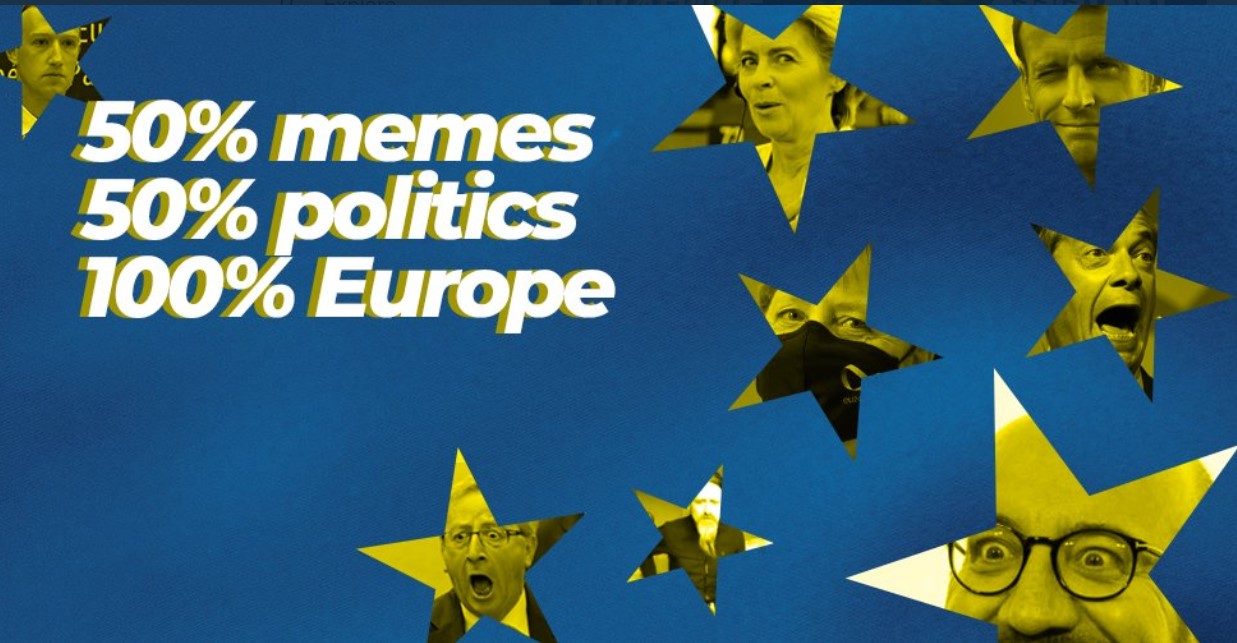MEPassistant is a Twitter account that people interested in EU politics may already be familiar with. Starting anonymously in 2013, the account focuses on the lighter side of the 'Brussels bubble,' often giving daily life in EU politics a humorous twist.
As the name implies, the man behind the account worked as an assistant for a Member of the European Parliament, even if he admits that he started out as a "young and naive" intern when he first arrived in Brussels. Quentin Deschendelliers, also known as MEPassistant on Twitter, at the time felt that there were not enough comedic EU politics accounts on social media, especially on the European Parliament, and decided to make his own.
"Brussels is seen as technocratic because people don't always understand how it works. But humour helps break the ice, as it can simplify how systems work and show that EU politicians are human too and not just stuck in an ivory tower."
Deschendellier got to experience 'the system' firsthand when he got a job as an MEP assistant. He explained that your quality of life in the European Parliament comes down to your MEP, as they can be a "wildcard."
"I was happy with my time in parliament but it's not for everyone. You can't expect civil servant hours, you do the job until it's done and during crunch time that can mean seven days a week from seven in the morning to ten at night. If there's pressure, it's because the MEPs are under pressure, which can be a burden psychologically – even if my MEP was easygoing."
Asked why anyone would opt for this lifestyle, Deschendellier said: "It's very international, it's the combination of the intellectual thrill, that you get to have influence and of course, there is Plux ( Place de Luxembourg). Basically, it's like being at Erasmus except you're getting paid."
According to Deschendellier, there is no day in the life as an MEP assistant, a job which can mean simultaneously mean political advisor, press officer, admin assistant, or intern manager, depending on the MEP's office.
"Parliament can be surreal, it's very much about egos. MEPs get random ideas. One veteran assistant once told me to never leave my MEP without tasks, as they will think of complex things to do."
Deschendellier describes the European Parliament itself as the "wildcard among the institutions... It's filled with young people, and it's the most engaged with citizens and wants to get itself noticed to have leverage over the other institutions."
"Then there is the technical juggernaut that is the Commission and the political entity that is the Council. Parliament needs to play its cards right. It might be weaker among the institutions but it still has its strengths as it's the only institution with public legitimacy, which makes it difficult for the Council or the Commission to lord it over the Parliament."
He stressed that although many MEP assistants are young, people are committed and often experts in their fields.
"I was between 25-27-years-old then but could hold my own on technical issues. We are serious."
Traveling circus
One peculiar aspect of European Parliament life is the monthly 'travelling circus' from Brussels to Strasbourg, where EU lawmakers vote on legal proposals during a week-long plenary. Frugal EU countries as well as Eurosceptics mock the trip as being a waste of public finances, while arguing that the institution would be better served by staying in Brussels.
"I will defend Strasbourg as a French [person]," Deschendellier laughed. "But the criticism makes sense, even if it is a moot point. The seat in Strasbourg is part of the treaties, and to change the treaties you would need France on board. France will never get on board for economic reasons; 5000 people going to Strasbourg every month is an economic boon."
"But people argue in bad faith. People slam it over money or energy costs, but mostly it's because they can't be bothered to go there."
Getting the unenthusiastic involved
After leaving the European Parliament, Deschendellier went down the lobbying path after his time in Parliament. Yet he still kept his social media profile up, as he believes humour is a "useful tool" to get people more involved with EU politics even if it is an uphill battle.
"It's a chicken and the egg situation. Are people not interested because national media don't write about it or vice versa," he asked.
Related News
- Swedish MEP cuts off hair during speech in support of Iranian women
- EU Parliament ratifies bill to implement common charger from autumn 2024
- MEPs call for EU sanctions against officials responsible for Mahsa Amini’s death
Deschendellier explained that people in France view the EU differently after Brexit. But he acknowledges the frustrations many still have with the EU if they feel it doesn't deliver.
"Sometimes it's well-founded, sometimes not. The EU has limited competencies, but they are expecting the EU to do what national governments do, which the EU can't because it's not a state. It puts the EU in a tight spot, which cynics use to make Brussels a scapegoat."
Deschendellier believes it is key to "show the human face behind EU politics" to engage people. "Brussels is people, that's something you can relate to. The question is how to make people relate to what you have to say."

